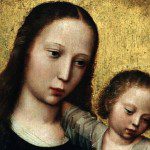I decided to do something different for my LifeSign sermon this weekend. Normally for Christmas, we look at the accounts of Christ’s birth given in the gospels of Matthew and Luke. Mark starts with Jesus’ baptism rather than his birth. John describes Jesus’ incarnation from His eternal perspective as the Word of God who became flesh. Part of John’s opening is one of my favorite verses in the whole Bible, John 1:5, which says, “The light shines in the darkness, and the darkness did not seize it.” Since there’s a lot of darkness in our world right now with school shootings and fiscal cliffs in the news, I felt called to preach on John 1:1-5 about the hope that is established by the incredible eternal identity of the baby who was born in Bethlehem. I will summarize my message below. Here is the audio:
I. Word
In the beginning was the Word. The Word was with God and the Word was God… Through Him all things were made. John 1:1-3
The Greek word logos is translated as “word” in English. Logos actually has a much wider range of meaning; it can be “logic,” “reason,” “speech,” or “pattern.” Basically the second member of the Trinity, who is sometimes called Son and other times called Word, is the discourse of God. We can think of Him as the architect who articulates the vision of the Father which is then put into practice by the Holy Spirit. At the same time, He is the Word in the sense of being God’s message to us. John 1:18 says, “No one has ever seen God, but the one and only Son… has made him known.” Jesus Himself is the standard for our theology. Nothing about God should be speculated that cannot b e confirmed in the character of Jesus.
This is a big problem in evangelical theology. Oftentimes, we try to create a good cop/bad cop duality between Son and Father, presumably as a way of resolving the tension between Jesus’ personality and the depiction of God created by the theodicy of the Old Testament in which every natural disaster and war must be explained as a product of God’s wrath. But the Son isn’t all meek and mild and the Father isn’t a merciless fuhrer. The love of God that Jesus shares is complicated and demanding. In any case, the enormous claim that Christianity makes is that the architect of everything in the reality that we see and know was born to a woman named Mary at a fixed point in history and became a baby who cried, drank breast milk, and soiled himself. That’s incredible!
II. Life
What came to be in Him was life, and that life was the light of humanity. John 1:4
The Word of God through whom all things are made is the constant source of all life. He is also the source of all knowledge, which is how interpret the phrase “light of humanity.” Anytime anyone discovers any kind of wisdom, they are tapping into the Word of God, though always imperfectly. There is a little bit of falsehood in every truth that we appropriate. Because I believe that Jesus is the Word of God made flesh, He is the Truth incarnate. Thus, all the truths that we discover in various disciplines like biology, economics, and so forth should not contradict the truth that Jesus speaks. Now I should qualify this by saying that Jesus did not share an opinion on many topics like quantum physics or molecular biology, so it would be contrived for us to try to twist Jesus’ words to support a particular opinion on topics that weren’t part of Jesus’ discourse. But generally speaking, truths that impact our ethical behavior should be measured against Jesus’ teachings.
Jesus describes the means by which He shares His life with us in John 15:5: “I am the vine; you are the branches. If you remain in me and I in you, you will bear much fruit; apart from me you can do nothing.” This statement has a double-meaning. On the one hand, as the Word of God in whom all things exist, Jesus is literally the vine of our being. This applies to everything in creation, including people who reject Christ. The basic error represented in Adam and Eve’s original sin is to think that we are the source of our own being. When we live in that delusion, we are like dead branches that have been cut off from the water supply of their vine through disease or other circumstances. Jesus’ incarnation is the means by which we are rescued from that delusion. By becoming branches on Jesus’ vine through our incorporation into the body of Christ which is the temporal reality created through Jesus’ incarnation, we discover the truth about how we exist in dependence upon the eternal Word of God that is also Christ.
III. Light
The light shines in the darkness, and the darkness did not seize it. John 1:5
The word in Greek for “seize” is katalambano. Lambano by itself means to “take” or “receive” something. The kata prefix creates an element of hostility to the taking. It is a snatching, seizing, or overcoming. Katalambano also has a figurative meaning related to the intellect of grasping a particular concept and appropriating it as the base on which to build further knowledge. The light of Christ is something we can never seize or comprehend. It is always beyond us because it is infinite. We can point to light, but if we try to grab it, we will end up with a fistful of darkness.
There are four different conceptual relationships I could think of that are reflected in the metaphorical relationship between light and darkness.
1) The truth of Christ will not be covered up by lies. No matter how hard the spin-doctors work to create a false narrative of reality, God’s truth will always break through. This is something I just have to trust, no matter how thoroughly brainwashed it seems like people around me have become.
2) The mystery of Christ cannot be dismissed by our self-certainty. Because Christ’s truth is infinite, it will always remain a mystery to us. I mean this in the original sense of mysterion. It’s not utterly unknowable, but always only partially within our comprehension, like something we can point to but never seize and conquer. Many Christians hate the concept of mystery because we want to be in control.
3) The beauty of Christ cannot be mocked by our cynicism. In our postmodern context, cynicism is a huge obstacle to experiencing beauty. But there is something about beauty which reproaches us for making fun of it. When beauty is persecuted, it cuts our hearts even however hard we try to repress our awareness of it.
4) The hope of Christ cannot be smothered by despair. We live in a world that’s filled with despair. It seems pretty well impossible that there will ever be peace in Palestine and Israel or that our government will make the compromises necessary to avoid another recession. But believing in the light of Christ that the darkness can’t put out means that we live as though impossible solutions are possible. Hope that is reasonable isn’t hope. True hope dreams of a happy ending that only God could bring about since it’s completely outside of the range of conceivable outcomes given the circumstances.












